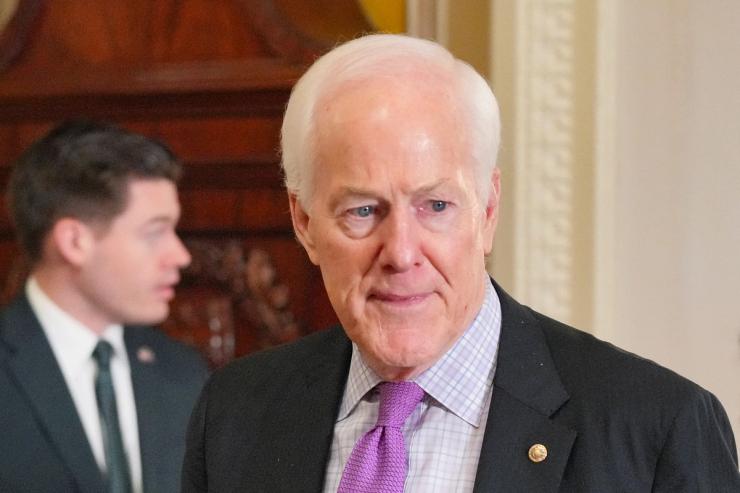The News
Republicans detest the idea of spending billions of dollars to shore up the Affordable Care Act. They are also realizing that the alternative could be a political disaster.
With health insurance premiums projected to skyrocket at the end of the year thanks to the expiration of tax credits Democrats enacted during the pandemic, Republicans are likely to focus on paring back those federal subsidies. But allowing them to go away entirely at the end of this year heading into the midterms?
“I don’t think that’s a good idea,” Sen. John Cornyn, R-Texas, told Semafor. He favors narrowing the income eligibility requirements for the health insurance credits from their current level, set at 400 percent of the federal poverty line — but not yet doing away with them altogether.
It’s a critical moment for the Republican Party, which began its post-Obama electoral comeback by vowing to repeal the former president’s signature health care law and then failing to do so. The GOP chipped away at Obamacare’s coverage requirements and eligibility over the past decade in two party-line tax-and-spending laws, including deep cuts to future Medicaid expansion.
But Republicans are still grappling with a challenging political dynamic: The health care law is both broadly popular and despised by the conservative base.
This year, the party has an obvious vehicle to pass a limited extension of the subsidies — a government funding bill which must by definition be bipartisan — and willing partners in the Democrats, who are eager to cut a deal preserving coverage that also avoids a shutdown. But Republicans’ long-running internal fights over how to handle health insurance coverage are far from settled, and party leaders are not eager to take a firm stance.
The GOP left the subsidies out of this year’s “big, beautiful” megabill amid immense pressure from deficit hawks to keep its price tag low and narrow margins that required them to bring along almost every member. Which means Republicans are now painfully divided over what to do next.
“I haven’t taken a final position on that. I know there’s opposition on some parts of the Republican side and a desire to transition them to a better system,” Senate Finance Chair Mike Crapo, R-Idaho, told Semafor. “It’s an issue which clearly we need to deal with … there’s lots of different positions, from pure extension to pure elimination.”
Conservatives are already lining up against an extension of the expiring subsidies, which would cost an estimated $20 billion to nearly $40 billion a year, depending on the proposal.
Democrats only extended the subsidies for three years in 2022’s party-line Inflation Reduction Act as part of a complicated negotiation with former Sen. Joe Manchin, I-W.Va., who sought to limit Democrats’ spending ambitions. A compromise proposed by moderate House Republicans and Democrats last week would extend them for just one year.
“The Freedom Caucus is against that. I mean, it’s incredibly expensive,” House Freedom Caucus Chair Andy Harris, R-Md., told Semafor. “The Democrats wrote the bill to expire in December … they could have written it to last forever. They didn’t. They wrote it to expire this year. So we should just let it expire.”
Harris added that the caucus might consider supporting an extension if lawmakers could offset the cost: “If someone wants to promise how we pay for it, maybe we’ll look at it.”
But that would probably require cutting somewhere else. The Trump administration recently floated finding savings from one change to Medicare, requiring patients to seek prior authorization for services. That would not cover the Obamacare subsidies’ tab.
“Pre-authorization won’t save that much money,” Harris said. “It never does.”
In this article:
Know More
Letting the credits expire entirely would have huge negative consequences for Republicans, who are already under relentless attack from Democrats for their latest bill’s cuts to Medicaid and food assistance.
Sen. Jon Ossoff, D-Ga., who is in one of the toughest re-election races in the country, said that Georgians “are going to see 20-40% increases in their premiums” if the credits expire. Sen. Chris Van Hollen, D-Md., said Marylanders would see a 10-12% increase.
“That’s what Republicans are effectively calling for if they don’t want to fix this problem,” Van Hollen said. He added that “they clearly have not prioritized that, or they would have put it in their so-called Big, Beautiful Bill.”
His comments were particularly pointed given that Democrats are looking at redrawing Maryland’s congressional districts to make Harris’ seat more competitive.
As Democrats weigh what to seek in exchange for agreeing to a GOP government funding plan, party leaders are publicly urging Republicans to repeal their future Medicaid cuts. But the Trump administration and Republicans have no immediate interest in touching them.
Extending the health insurance tax credits, by contrast, is a more realistic target for bipartisanship.
“If they want to go the route of a bipartisan process to fund the government as they should, these are some of the things that need to be addressed,” said Sen. Mark Kelly, D-Ariz. “There’s things you can do to mitigate some of the pain the American people are going to suffer here … it’s in [Republicans’] best interest.”
Even so, Democrats won’t fully commit to supporting a funding deal just because it extends the Obamacare credits.
“There are lots of pieces to this,” Van Hollen said. “You have to look at the whole package.”
Room for Disagreement
Conservatives argue the expanded subsidies are specific to Covid, so they’re no longer needed.
“The proposal is not to end subsidies for Obamacare; it’s to end subsidies that were passed for emergency reasons during the pandemic,” said Sen. John Kennedy, R-La.
Notable
- House Speaker Mike Johnson told Punchbowl News last week that he doesn’t “love” the expanded subsidies but he “understand[s] the political realities.”
- House Ways and Means Chair Jason Smith, R-Mo., told Bloomberg TV that he would also want tighter income limits if the subsidies are extended.

